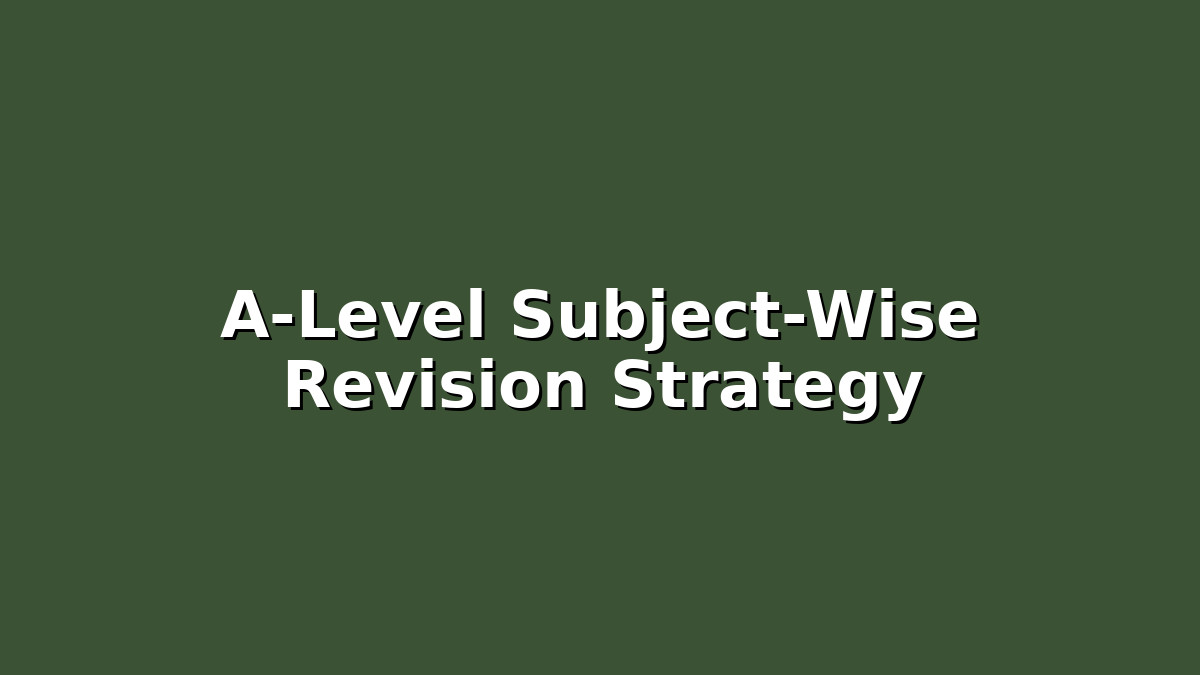Preparing for A-Level exams can feel overwhelming, especially when juggling multiple subjects with different requirements and content. However, having a clear, subject-wise revision strategy can make a significant difference in your confidence and performance. Whether you’re tackling sciences, humanities, or languages, tailoring your revision methods to each subject’s unique demands will help you study smarter, not harder. In this article, we’ll guide you through effective revision techniques for three broad subject categories: Sciences, Humanities, and Languages. By the end, you’ll have practical tips to create a balanced, efficient revision plan that works for you.
Section 1: Revision Strategies for Science Subjects (Biology, Chemistry, Physics, Maths)
Science subjects often involve understanding concepts, solving problems, memorizing formulas, and applying knowledge to new scenarios. Here’s how to approach revision for sciences effectively:
1. Understand Concepts Before Memorizing
Before diving into rote learning, make sure you grasp the fundamental concepts. Use your textbooks, revision guides, and online resources like videos and interactive tutorials. For example, in Physics, understanding the principles behind formulas will help you solve unfamiliar problems, not just memorize answers.
2. Practice Past Papers Regularly
Science and Maths subjects rely heavily on application. Practicing past papers is essential. Start by attempting questions without looking at the solutions. Then review your answers critically. Identify patterns in question types and focus on weak areas. Timed practice can also build exam stamina and improve speed.
3. Use Visual Aids and Practice Diagrams
Many science topics are easier to understand visually. Draw diagrams for processes like the circulatory system in Biology or reaction mechanisms in Chemistry. Mind maps can help summarize complex information. For Maths, write out step-by-step solutions to problems to reinforce problem-solving methods.
4. Make Formula Sheets and Flashcards
Create concise formula sheets or flashcards for quick review. Include definitions, units, and key equations. Regularly test yourself with flashcards to improve recall. Apps like Anki can be very useful for spaced repetition.
5. Form Study Groups
Discussing difficult concepts or solving problems together with peers can deepen understanding. Teaching a concept to someone else is one of the best ways to reinforce your learning.
Section 2: Revision Strategies for Humanities Subjects (History, Geography, Literature, Sociology)
Humanities subjects often require critical thinking, essay writing, and memorization of dates, theories, or case studies. Here’s a subject-wise approach to revise effectively:
1. Organize Notes and Create Timelines
For History or Geography, organizing your notes chronologically or thematically is key. Create timelines to track events, causes, and effects, which help in making sense of complex information. In Sociology or Literature, summarize key theories, themes, and quotes for easy retrieval during exams.
2. Practice Essay Writing and Source Analysis
Essays are integral to humanities exams. Practice writing essays under timed conditions to improve structuring your arguments clearly and coherently. Also, practice source analysis questions by critically evaluating documents or texts, which is often a big component of History or Sociology exams.
3. Use Mnemonics and Storytelling
Memorizing facts and dates can be challenging. Use mnemonic devices or turn facts into stories to make them more memorable. For example, create an acronym to remember the causes of the French Revolution or a story linking key literary themes.
4. Engage with Multiple Resources
Don’t rely solely on your notes. Read different textbooks, watch documentaries, or listen to podcasts related to your topics. This variety helps reinforce your knowledge and provides different perspectives, especially useful for essay writing.
5. Discuss and Debate
Engage in discussions with classmates or teachers. Debating historical interpretations or sociological theories helps you develop critical thinking and improve your ability to argue effectively in essays.
Section 3: Revision Strategies for Language Subjects (English Literature, Modern Foreign Languages)
Language subjects require a mix of comprehension, critical analysis, vocabulary building, and oral skills. Here’s how to effectively revise languages:
1. Read Actively and Annotate Texts
For English Literature or foreign language literature, active reading is crucial. Annotate your texts by highlighting important passages, noting literary devices, themes, and character development. This makes essay planning easier and improves your analytical skills.
2. Build Vocabulary and Grammar Skills
In modern languages, expanding your vocabulary and mastering grammar rules are foundational. Use flashcards, language apps, and regular writing exercises. Try to incorporate new words into sentences or spoken practice to cement your knowledge.
3. Practice Speaking and Listening
Don’t neglect oral skills. Record yourself speaking on various topics or practice with a study partner. Listen to podcasts, watch films, or use language learning platforms to improve your listening comprehension, which is often a challenging exam component.
4. Plan and Write Essays or Translations
Practice writing essays, summaries, or translations under timed conditions. This helps with time management and familiarizes you with exam formats. Review model essays and learn useful phrases or connectors to improve your writing style.
5. Review and Revise Past Exam Questions
Use past papers to practice all skill areas: reading, writing, speaking, and listening. Analyze examiners’ reports if available to understand common mistakes and how to avoid them.
Conclusion
A-Level exams are a marathon, not a sprint, and adopting a subject-wise revision strategy can make your preparation more organized, targeted, and effective. Remember, each subject has its unique demands—sciences need concept mastery and problem-solving practice; humanities require critical thinking and essay skills; languages call for vocabulary building, reading, and oral practice.
Start by assessing your strengths and weaknesses in each subject, then build your revision plan around those insights. Use a mix of active learning methods—practice questions, teaching peers, writing essays, and regular self-testing. Most importantly, stay consistent and don’t hesitate to ask for help when you need it.
With determination and a smart revision strategy, you’ll be well on your way to achieving the A-Level results you’re aiming for. Keep calm, stay positive, and remember that every small effort counts toward success!

Responses